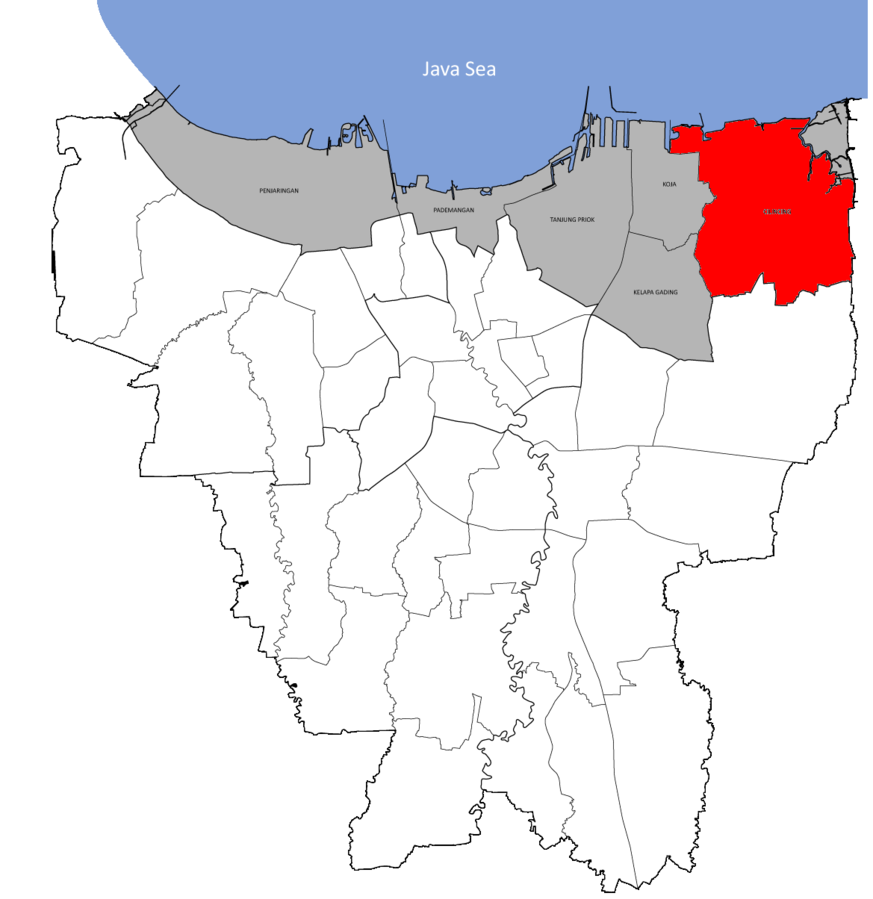The Sinking of Jakarta
Courtesy of Koektrommel and Rochelimit (Original)
The map of land loss of Jakarta. The grep parts mean how much land has sunk. The red means total danger.
The capital of Indonesia, Jakarta, has been sinking for many decades. Due to this, the area is full of flooding, destroying many Indonesian homes. Many homes were damaged, forcing citizens to move to different cities to escape the floods. According to CNA, Northern Jakarta has sunk 2.5 meters in the past ten years. Some of the land in Northern Jarkata has disappeared and more land will likely vanish in the future. According to BBC, the entire city will be submerged by 2050. One of the main reasons for the city sinking is the lack of water as Indonesia’s population overuses the water supply.
Jakarta has been undergoing problems with the water supply ever since the Dutch colonization. According to Vox, The Dutch segregated the native people into different areas. While they were ruling Indonesia, their water supply was distributed properly except to the native people who had to find their source of water somewhere else since they were discriminated against by the Dutch. Many native Indonesians were not given equal rights, leading to an unequal water system. Even though Indonesians gained independence from the Dutch, they obtained their water from the underground. And as more people took water from the underground, the soil started to sink. The land became denser as the water was drained out of the ground. The underground usually fills up when the rains pour. Each year, more land increasingly keeps decreasing. Some mosques had to be abandoned by people due to excessive flooding. Many of the roads are made out of concrete. As there is less water soaking the land, more land keeps getting denser and denser, similar to a deflated sponge, making it hard for water to flow up the ground to provide to the residents of Indonesia.
Almost every six months, cracks in walls appear, making people constantly have to rebuild certain parts of the building to prevent them from breaking off. As more people get water from underground, it is dangerous for people living in buildings since it is absorbed in the ground. Many citizens take more than needed which deteriorates the water supply issue. According to BBC, experts confirm that water authorities can only meet up to 40% of Indonesian citizens’ demand for fresh water as it is a slight improvement from the original situation. More than half of the population still does not have an adequate amount of water. This is a huge problem around many parts of the world as many people will have to find different ways to get water.
The rise of climate change is leading to higher sea levels around coastal cities which alarmingly makes Jarkarta sink faster as it is getting flooded with more water due to polar ice glaciers melting. Many coastal cities are facing the same issue of sea levels and are making plans to combat them. Due to multiple factors contributing to the situation, the Indonesian government is deciding to move its capital to Borneo to avoid being completely sunken.
Many authorities and citizens have found ways to help prevent their homes and their businesses being flooded. In certain areas, people built walls to prevent flooding. Indonesian authorities are well-aware of this problem. They are also making plans to make safe water extraction to lower the reduction of the land sinking. According to Vox, canal systems have been dredged and widened, seawalls are being built, and water retention basins have been excavated. The local government banned the use of new deep wells to help improve the situation. According to Linkedin, Jakarta Governor Anies Baswedan stated that his office intends to introduce a permit and taxation system for groundwater usage in areas not served by the water mains system. Homeowners extracting water from underground without the permit can lead to fines plus larger companies could have their building repeal their certificate.
In conclusion, as more people are becoming aware of the situation, the government is planning new ways for a proper water system that can reduce the use of underground water. With a better understanding, Jakarta can be saved and preserve its history






